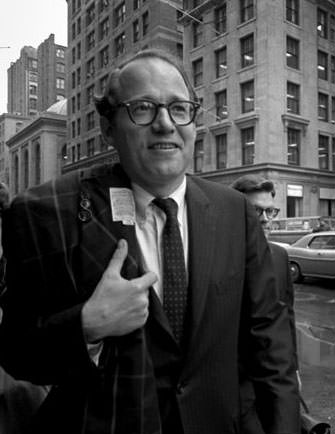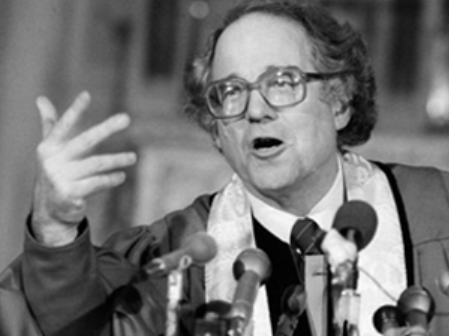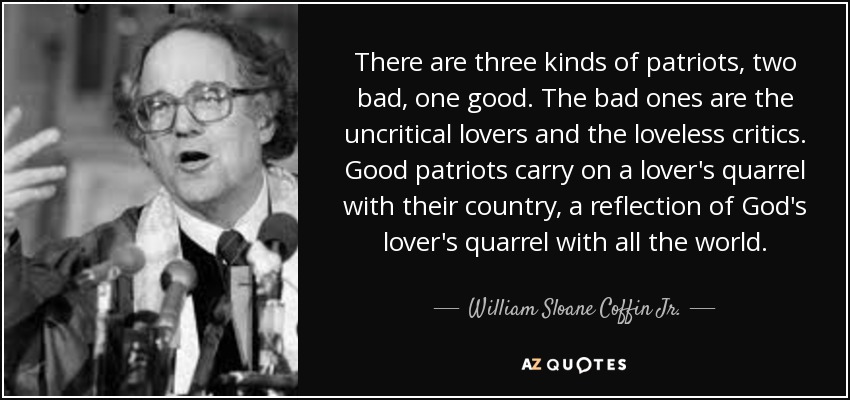A Memory of William Sloan Coffin
Note From ClassBook Editor Carney Mimms: My good friend, Nick Levitin, wrote this lovely tribute about Reverend Coffin. It doesn’t really fit in the ClassBook, but it’s so heartfelt that I wanted to share it.
A Memory of William Sloan Coffin
By Nick Levitin
I arrived in New Haven for my first job during a particularly volatile time – 1968. The Vietnam War, the assassination of the Rev. Martin Luther King, Jr. and shortly thereafter the assassination of Robert F. Kennedy, had affected us all deeply. We were in shock and we were enraged.
I had just graduated from Boston University and was about to begin my first professional acting job at The Long Wharf Theatre. Having attended scores of anti-war demonstrations in Boston and Washington, I was drawn to a demonstration against the war at the New Haven Green. It was there that I had my first encounter with the Rev. Coffin.
As the crowd filled the Green, a downpour began, and Coffin invited us all to Battell Chapel. In no time the Chapel was filled with denim-clothed, long-haired hippies and some regular folk as well. The mood was celebratory. Having been touched by the rain a bit everyone seemed particularly alert and eager for the rally to begin. Coffin ascended the pulpit. He was the first clergy member I had ever encountered who had a particularly masculine bearing. There was nothing timid about him. He looked over the sea of denim and proclaimed loudly, “I’d like to welcome you all to Battell Chapel. I know that many of you don’t necessarily believe in God, but God believes in you!” The crowd roared. I still get chills when I remember that moment. In an instant, he had won over the crowd, and the rally had a certain moral authority that was richer because of his presence.
As New Haven became my home for a while, I was confronted with what I was going to do about the draft. I needed to make a decision — if, in fact, I was a conscientious objector, or not. And, if I didn’t fit the criteria, was I willing to go to jail for my principles? I was directed to a graduate divinity student who was studying with Coffin at the time. Sadly, I have forgotten his name. He was a wonderful guide for a number of us who were grappling with this issue. As it turned out, we met frequently, and we met in Coffin’s home although he was never there when we were. Eventually, I realized that I was a conscientious objector and with the divinity student’s help, I filled out the application and sent it to my draft board in New York City. Within a relatively short period of time, my request for such a designation was miraculously granted.
 Ten years later, I was driving a cab in New York. It was my so-called “day” job, while I looked for work as an actor. One cold winter night, there was a huge snowstorm. I found myself driving past Riverside Church where Coffin had become the Senior Minister in 1977. A gentleman flagged me down, got into my cab and directed me to Carnegie Hall. Once we got going, I looked in the rear view only to discover that my passenger was Bill Coffin. I introduced myself, told him of my encounter with him, his divinity student, and his home in New Haven back in 1968.
Ten years later, I was driving a cab in New York. It was my so-called “day” job, while I looked for work as an actor. One cold winter night, there was a huge snowstorm. I found myself driving past Riverside Church where Coffin had become the Senior Minister in 1977. A gentleman flagged me down, got into my cab and directed me to Carnegie Hall. Once we got going, I looked in the rear view only to discover that my passenger was Bill Coffin. I introduced myself, told him of my encounter with him, his divinity student, and his home in New Haven back in 1968.
It was snowing furiously as I tried to make my way to Carnegie Hall. It took quite a while to get there. But now I had an opportunity to spend time with this man who I had grown to admire over the years. It was magical and I savored every minute of it. We talked about the war, we talked about theology, and we talked about music. Finally, we arrived at Carnegie Hall and parted ways.
Bill Coffin touched my life only briefly, but I shall always remember him with fondness and the greatest admiration. He was a prophetic figure who took a moral stand during a frightening time. And, he was there to support those of us who for the first had to face the world as it was, not as we had hoped it would be. I feel particularly grateful to have met him.


